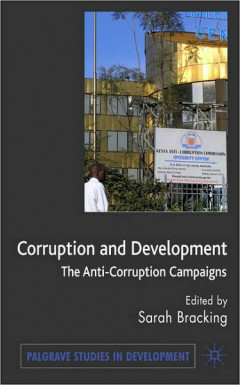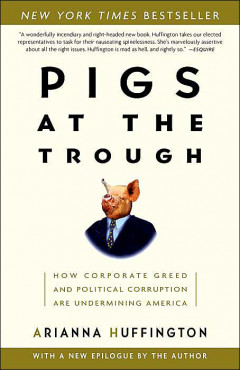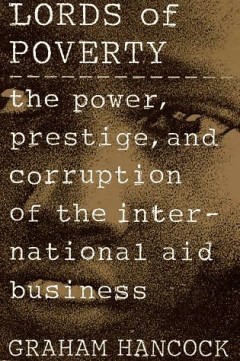Ditapis dengan

Corruption and development : the anti-corruption campaigns
This book provides a multidisciplinary interrogation of the global anti-corruption campaigns of the last ten years, arguing that while some positive change is observable, the period is also replete with perverse consequences and unintended outcomes
- Edisi
- -
- ISBN/ISSN
- 0230525504
- Deskripsi Fisik
- 310p.
- Judul Seri
- -
- No. Panggil
- 364.1 Bra c

Pigs at the trough : how corporate greed and political corruption are undermi…
- Edisi
- -
- ISBN/ISSN
- 1400047714
- Deskripsi Fisik
- 275 p. ; 22 cm.
- Judul Seri
- -
- No. Panggil
- 364.1323 Huf p
- Edisi
- -
- ISBN/ISSN
- 1400047714
- Deskripsi Fisik
- 275 p. ; 22 cm.
- Judul Seri
- -
- No. Panggil
- 364.1323 Huf p

Lords of poverty : the power, prestige, and corruption of the international a…
Lords of Poverty is a case study in betrayals of a public trust. The shortcomings of aid are numerous, and serious enough to raise questions about the viability of the practice at its most fundamental levels. Hancocks report is thorough, deeply shocking, and certain to cause critical reevaluation of the governments motives in giving foreign aid, and of the true needs of our intended beneficiaries.
- Edisi
- -
- ISBN/ISSN
- 9780871134691
- Deskripsi Fisik
- xvi, 234 p. ; 22 cm.
- Judul Seri
- -
- No. Panggil
- 338.9 Han l

Corruption and development : the anti-corruption campaigns
This book provides a multidisciplinary interrogation of the global anti-corruption campaigns of the last ten years, arguing that while some positive change is observable, the period is also replete with perverse consequences and unintended outcomes
- Edisi
- -
- ISBN/ISSN
- 0230525504
- Deskripsi Fisik
- 310p.
- Judul Seri
- -
- No. Panggil
- 364.1 Bra c

Pigs at the trough : how corporate greed and political corruption are undermi…
- Edisi
- -
- ISBN/ISSN
- 1400047714
- Deskripsi Fisik
- 275 p. ; 22 cm.
- Judul Seri
- -
- No. Panggil
- 364.1323 Huf p
- Edisi
- -
- ISBN/ISSN
- 1400047714
- Deskripsi Fisik
- 275 p. ; 22 cm.
- Judul Seri
- -
- No. Panggil
- 364.1323 Huf p

Lords of poverty : the power, prestige, and corruption of the international a…
Lords of Poverty is a case study in betrayals of a public trust. The shortcomings of aid are numerous, and serious enough to raise questions about the viability of the practice at its most fundamental levels. Hancocks report is thorough, deeply shocking, and certain to cause critical reevaluation of the governments motives in giving foreign aid, and of the true needs of our intended beneficiaries.
- Edisi
- -
- ISBN/ISSN
- 9780871134691
- Deskripsi Fisik
- xvi, 234 p. ; 22 cm.
- Judul Seri
- -
- No. Panggil
- 338.9 Han l

Corruption and development : the anti-corruption campaigns
This book provides a multidisciplinary interrogation of the global anti-corruption campaigns of the last ten years, arguing that while some positive change is observable, the period is also replete with perverse consequences and unintended outcomes
- Edisi
- -
- ISBN/ISSN
- 0230525504
- Deskripsi Fisik
- 310p.
- Judul Seri
- -
- No. Panggil
- 364.1 Bra c

Pigs at the trough : how corporate greed and political corruption are undermi…
- Edisi
- -
- ISBN/ISSN
- 1400047714
- Deskripsi Fisik
- 275 p. ; 22 cm.
- Judul Seri
- -
- No. Panggil
- 364.1323 Huf p
- Edisi
- -
- ISBN/ISSN
- 1400047714
- Deskripsi Fisik
- 275 p. ; 22 cm.
- Judul Seri
- -
- No. Panggil
- 364.1323 Huf p

Lords of poverty : the power, prestige, and corruption of the international a…
Lords of Poverty is a case study in betrayals of a public trust. The shortcomings of aid are numerous, and serious enough to raise questions about the viability of the practice at its most fundamental levels. Hancocks report is thorough, deeply shocking, and certain to cause critical reevaluation of the governments motives in giving foreign aid, and of the true needs of our intended beneficiaries.
- Edisi
- -
- ISBN/ISSN
- 9780871134691
- Deskripsi Fisik
- xvi, 234 p. ; 22 cm.
- Judul Seri
- -
- No. Panggil
- 338.9 Han l
 Karya Umum
Karya Umum  Filsafat
Filsafat  Agama
Agama  Ilmu-ilmu Sosial
Ilmu-ilmu Sosial  Bahasa
Bahasa  Ilmu-ilmu Murni
Ilmu-ilmu Murni  Ilmu-ilmu Terapan
Ilmu-ilmu Terapan  Kesenian, Hiburan, dan Olahraga
Kesenian, Hiburan, dan Olahraga  Kesusastraan
Kesusastraan  Geografi dan Sejarah
Geografi dan Sejarah